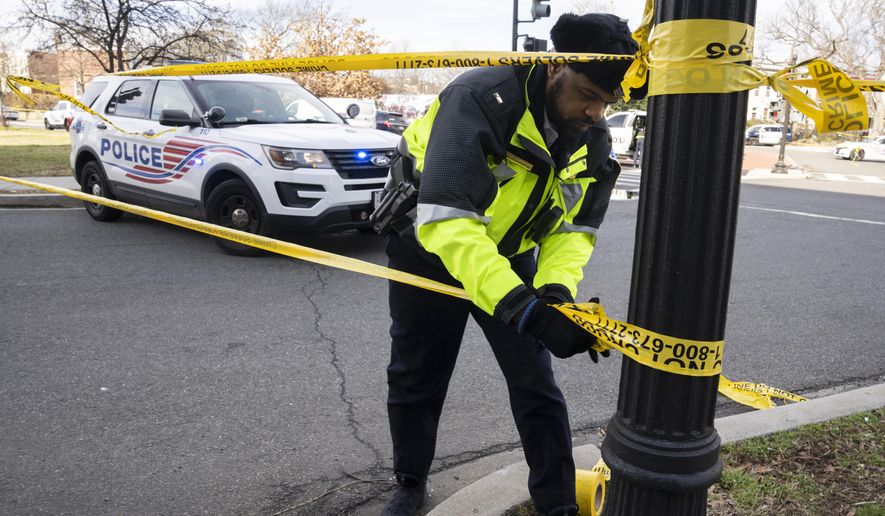A Republican congressman said some lawmakers are so fearful about crime in the District, they’ve been sleeping at the Capitol.
Missouri Rep. Eric Burlison said Wednesday on radio’s “Todd Starnes Show” that he and other legislators hunker down in their Capitol Hill offices because the city has become “very dangerous” after dark.
“I don’t want to walk back and forth from an apartment in D.C. at night or in the morning — early morning — to get to work,” Mr. Burlison said. “It’s not a safe environment.”
The congressman also pointed out the concerns over carjackings after Rep. Henry Cuellar, Texas Democrat, had his car stolen at gunpoint in the Navy Yard neighborhood this week.
Mr. Burlison said, “It’s insane to even own a car in D.C. because wherever you park, it is going to cost you a fortune and it’s likely to get broken into and you’re likely to get carjacked.”
D.C. police data shows a record-high 760 carjackings have been reported in the city this year — more than double the 360 that were documented through the same period last year.
SEE ALSO: Carjackers in D.C. smash 2022 record, reach every part of capital
The violent car thefts in D.C. also smashes 2022’s end-of-year total of 484 carjackings, the previous record high for the nation’s capital.
The District has been besieged by violent crime all year long, with homicides (up 38%), robberies (up 70%) and carjackings (up 111%) well above where they were at this point in 2022.
Violent crime in general is up 40% since last year, and total crime is up 28%.
“Any reasonable person would be afraid of the increase in crime and the danger of being in the capital,” Rep. Andy Harris, Maryland Republican, told The Washington Times. “Personally, I think that Congress should return to its constitutional authority and take over more of the way Washington, D.C., is run. I think the current government in [the city] is an abject failure.”
Congressional Republicans have used their oversight authority to shut down local D.C. laws that legislators feel threaten public safety.
The GOP led a bipartisan effort this spring to overturn a massive rewrite of the District’s criminal code that would have lowered penalties for most violent crimes.
The process to negate the overhauled criminal code started in February, around the time Rep. Angie Craig, Minnesota Democrat, was assaulted in her apartment building by a man with 12 prior convictions.
A month later, a member of Sen. Rand Paul’s staff was stabbed at random by a man who had just finished a lengthy prison term.
The summer spike in robberies and carjackings frequently turned into deadly shootings.
In July alone, a Kentucky tourist, a construction worker, a bike messenger and an interpreter who served in the Afghanistan War were all gunned down in stickups for either their personal items or their cars.
Some lawmakers have learned how they can better protect themselves while out in the city.
Law enforcement officials gave politicians and staffers safety tips during a meeting hosted by Rep. Bryan Steil, Wisconsin Republican, last month.
Those in attendance were advised to keep phone calls short to avoid distracting themselves, and to leave space at red lights in case they need to speed away from would-be carjackers.
But other lawmakers have sought out personal bodyguards to give themselves peace of mind in the District.
The owner of a private security firm who works in the national capital region told The Times more members of Congress are contracting with security companies when they’re out and about in the city.
This owner also said their business has grown 300% since the Black Lives Matter protests in 2020.
The D.C. Council defunded part of its Metropolitan Police force in the wake of those protests. The city now has a 50-year low in active duty officers and is suffering from violence not seen in nearly two decades.
The council on Tuesday renewed emergency legislation that gives judges more leeway to keep adults and juveniles behind bars if they’re accused of homicide or carjacking. The temporary law was extended another 90 days, meaning it will be in effect until early next year.
• Matt Delaney can be reached at mdelaney@washingtontimes.com.




Please read our comment policy before commenting.